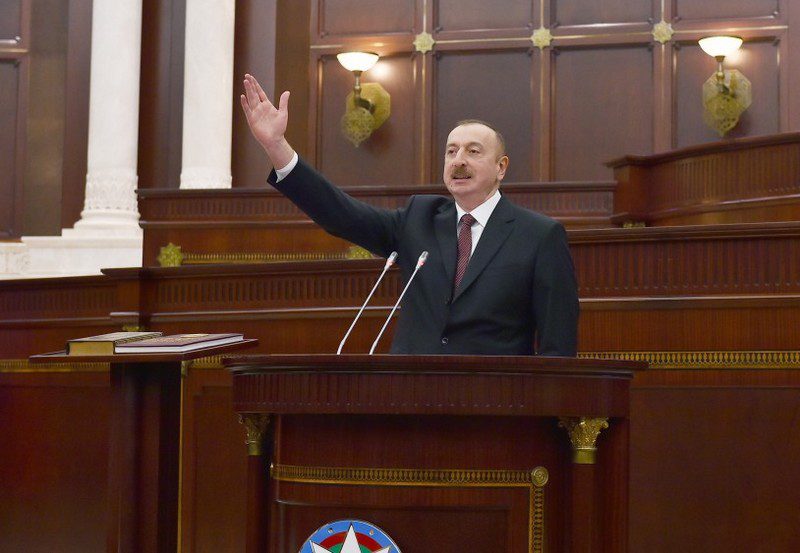Artsakh’s President Arayik Harutyunyan made a huge mistake last Thursday when he succumbed to the pressure of Pres. Ilham Aliyev of Azerbaijan, dismissing State Minister Ruben Vardanyan, a billionaire businessman who had made his fortune in Moscow. Last September, Vardanyan renounced his Russian citizenship and settled in Artsakh, saying he wants to be with his people at their greatest hour of need. Shortly after his move, Pres. Harutyunyan appointed him as State Minister of Artsakh.
The President of Artsakh should not have fired Vardanyan or should have at least waited for a while so it did not look like he was carrying out Aliyev’s orders so promptly. Unfortunately, Vardanyan was dismissed right after the International Court of Justice increased the pressure on Azerbaijan by ruling against it.
Shamefully, Gurgen Arsenyan, a Member of Parliament from Prime Minister Nikol Pashinyan’s ruling party, made the following treacherous statement in Parliament in February: “there is no need to risk three million Armenians for the sake of Artsakh.” It is never a good idea when you and your enemy are on the same side!
Recently, several Azeri journalists and even Pres. Aliyav denigrated Vardanyan by calling him “a Russian oligarch, criminal, and money launderer.”
In Oct. 2022, Aliyev personally complained to Pres. Vladimir Putin of Russia about Vardanyan. Putin told Aliyev that he knew nothing about Vardanyan’s presence and activities in Artsakh.
On Nov. 17, 2022, during a meeting with Dirk Schuebel, Special Envoy of the European Union for the Eastern Partnership, Aliyev said that he refuses to negotiate with Vardanyan, whom he called “Moscow’s emissary” in Karabakh. Aliyev continued: “We are ready to talk…with Armenians who live in Karabakh, not with those who have been sent from Moscow hiding in their pockets billions of dollars money stolen from Russian people, like the man called Vardanyan who was transferred from Moscow there with a very clear agenda.”
On February 18, 2023, during a panel discussion in Munich, Germany, with Prime Minister Pashinyan, Aliyev said that he is ready to start practical communication with representatives of the Armenian community in the Karabakh region: “But, we can do it only when Russian citizen criminal oligarch, a person who was involved in money laundering in Europe, Vardanyan, is out of our territory.” Aliyev added: Vardanyan “was exported from Russia to have the leading position in Karabakh. Maybe exported is not the right word. I would probably prefer the word smuggled.”
It is not up to Aliyev to decide who should represent Artsakh in negotiations. That’s the decision of Artsakh’s government. It would have been wiser for the President of Artsakh not to dismiss Vardanyan at all, just to show Aliyev who calls the shots in Artsakh.
I suggest that Vardanyan file lawsuits for libel in the European Court of Human Rights against all those who told lies about him, forcing the scandalous Azeri journalists and Pres. Aliyev himself to pay a hefty penalty and publicly apologize to Vardanyan.
Finally, it is not a good idea to succumb to pressures from your enemies which only encourage them to demand further concessions from you. The list of their demands is endless.
Here are some current and potential Azeri demands from Artsakh and Armenia:
— Azerbaijan to place its checkpoints on the Lachin Corridor;
— The future ‘Zangezur Corridor’, linking Azerbaijan with Nakhichevan, to enjoy a status similar to the Lachin Corridor;
— Seeking further concessions, even after the Lachin Corridor is opened, Azerbaijan will probably block it again;
— After the fake Azeri environmentalists demanded to inspect the mines in Artsakh, its leaders unwisely shut down the mines, thus encouraging the Azeris to demand more concessions, instead of telling them: “that’s none of your business,” which led to the next Azeri demand that Armenians stop extracting metals from Artsakh mines;
— Seeking further Armenian concessions, Azeri forces will probably occupy more territories of the Republic of Armenia.
Similarly, Turkey will seek concessions demanding that Armenia:
— Delete from its Declaration of Independence the reference to the Armenian Genocide in “Ottoman Turkey and Western Armenia.” If not, Turkey would threaten to shut down the border with Armenia after opening it;
— Stop campaigning for the international recognition of the Armenian Genocide;
— Accept the existing borders with Turkey, giving up any future claims for the territories of Western Armenia;
— Ban the burning of the Turkish flag on April 24;
— Give up any demands for restitution from Turkey for the Genocide losses.
The leaders of Armenia and Artsakh should understand that appeasing a bully leads to more bullying, not to peace.
Regrettably, despite sacrificing Vardanyan at Aliyev’s request, expecting that Azerbaijan would then unblock the Lachin Corridor in return, the Corridor is still blocked as of Feb. 27. Even after a closed door meeting on Feb. 25 between the representatives of Artsakh and Azerbaijan, the Corridor remains closed.
Vardanyan announced that despite his dismissal, he will continue to live in Artsakh. It is unknown what role is he able or willing to play without an official position.
Only one mystery remains. What did Pres. Harutyunyan and State Minister Vardanyan do in Moscow earlier in February when both of them traveled separately to Moscow and returned to Artsakh within a few days? Why did they go to Moscow? Who did they meet with? What did they talk about? Neither one has said a word about that visit. Knowing the answers to these questions may shed additional light on Vardanyan’s dismissal.






